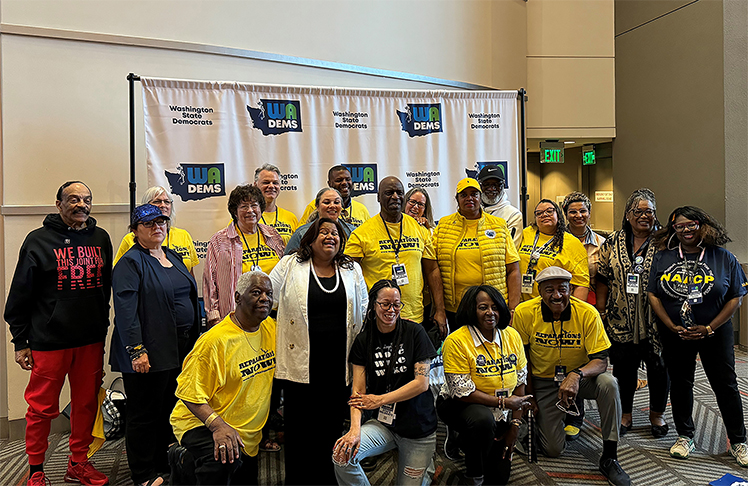
By Aaron Allen, The Seattle Medium
On Sunday, the Washington State Democratic Party voted to put forth a resolution calling on Governor Jay Inslee to create Washington state’s first statewide commission to study reparations, reconciliation, and remedies for the descendants of enslaved Africans in America. This initiative was one of several election priorities addressing rights, freedoms, and the protection of democracy discussed during their convention in Bellevue over the weekend.
“Democrats stand united and ready to fight to defend our rights and freedoms this election,” said Shasti Conrad, Chair of the Washington State Democrats. “As a big tent party, we’ve proven we can debate vigorously while honoring our democratic principles. I want to thank every single delegate who made this possible. I encourage voters across the state to join us in building a better state and country that works for everyone.”
Delegates from across the state gathered to address the issue of reparations. According to Governor Inslee’s 2023 Supplemental Budget Report, nearly 50% of Washington state’s estimated 300,000 African American residents live below the poverty level. Black leaders have long pushed for legislators and leadership to bring about meaningful debate, dialogue, and data to help bring this commission to fruition.
Darrell Powell, President of the Seattle Chapter of the NAACP and a convention delegate, was in attendance to show his support, provide his vote for the resolutions and his role as a delegate.
“My main focus here today is Resolution Number Two,” says Powell. “This platform is about establishing a reparation task force or rather commission at the state level to talk about the reparations for the descendants of slaves.”
In 2022, the Washington State Minority and Justice Commission, established by the state Supreme Court in 1990, presented a symposium to the justices to examine the legal issues, practical applications, and historical context of reparations to Black Americans. Jesse Wineberry, former Washington state house representative and one of the creators of the Minority and Justice Commission, emphasized the importance of research in the commission’s work.
“Once the commission is created the first thing, we have to do is research,” says Wineberry. “Talking about the Washington State Supreme Court. I remember hearing about that and definitely should be a part of our research. Reviewing that and seeing what kind of data came out of that presentation because there may be something useful there. That’s why this commission is needed because there hasn’t been a concerted effort to bring all of the data, all of the research together in one place and analyze it and really see.”
While questions about funding, eligibility, and challenges are anticipated, Wineberry assures that these will be addressed within the commission’s work.
“Recommendations in terms of funding this thing, which is way down the road that there will be some funding made available,” says Wineberry. “Debate will include talking about who is eligible for the benefits, how to find out if you are eligible and this will be challenging, but funding should be made available to enable the average citizen who may not be able to afford it on their own to trace their lineage. And I think everybody should be afforded the opportunity to do so.”
The resolution went uncontested and was placed at the number two spot on the priority list, receiving unanimous approval. Governor Inslee looks to secure this effort by Executive Order to begin the commission in 2024.
“This resolution came out of the platform and resolutions committee with zero opposition,” says Wineberry. “That’s the only way you could get on that list, and we had a vote of 23 to nothing in favor. So, we were the beneficiaries of the one vote, the final vote that was cast tonight. The resolution itself says ‘the governor shall issue an executive order creating it in 2024.”

